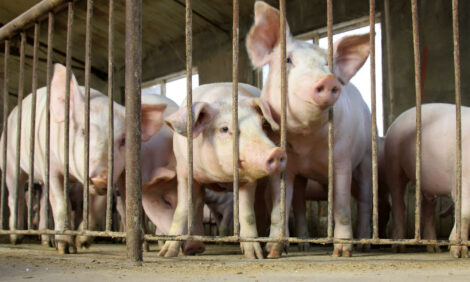



New Canadian Slaughter Capacity Key to Minimizing Impact of M-COOL
CANADA - Pork producers in Canada believe expanded Canadian hog slaughtering capacity is the best defense against the negative trade implications of proposed U.S. Mandatory Country of Origin Labelling (M-COOL) legislation.A revised version of the M-COOL provision, contained in the 2007 U.S. Farm Bill passed by the U.S. House of Representatives, identifies four product labels. Under the proposed fix, meat from animals born raised and slaughtered in the U.S. would be labelled as originating in the U.S. A second multi-country label would identify meat from animals produced partially in another country. Products from livestock imported into the U.S. for immediate slaughter would be identified by a third label. And the fourth would identify meat from animals produced and slaughtered in another country. Although there are still several steps before the bill becomes law, M-COOL is expected to take effect September 30, 2008.
Labelling Requirements Expected to Increase Cost of Processing Canadian Hogs
The main concern among Canadian pork producers is that U.S. slaughter plants will be unwilling to bear the cost of maintaining the necessary records and keeping American and Canadian hogs separate to allow them to be labelled differently.
“It appears very much like Country of Origin Labelling will have the largest impact on hogs that are produced and finished in Canada and shipped directly for slaughter into the U.S.,” says Florian Possberg, the CEO of Big Sky Farms and the Chair of the Saskatchewan Slaughter Plant Initiative. He estimates that 2.7 million of the of the 8.8 million hogs shipped from Canada to the U.S. last year were slaughter hogs.
Karl Kynoch, the chair of Manitoba Pork Council wonders if M-COOL will restrict access to U.S. plants, how much burden will processing Canadian hogs place on U.S. plants, and will those plants still be willing to buy Canadian hogs?
Slaughter Hogs Shipped South Likely to Be Discounted
Possberg believes the 2.7 million market hogs produced in Canada and shipped south for slaughtering will probably carry a discount. “Most of the plants we’ve talked to in the U.S. will accept hogs that are grown out in the U.S. from Canada. So the feeder pigs and early weans that go down, we don’t think will be significantly discounted. The big question mark is what will happen to these market hogs?”
He observes many producers are planning to reduce the risk either by finding slaughter capacity in Canada for those hogs or taking them to the U.S. for finishing.
Restructuring Limits Canadian Slaughter Capacity
Restructuring within the Canadian meat packing industry, including the closure of Maple Leaf’s primary processing plant in Saskatoon and the pending closure of its plant on Marion Street in Winnipeg to pave the way for double shifting its Brandon plant, has put a squeeze on Canadian delivery options.
“A number of producers I know are signing longer term contracts with Canadian slaughter plants and trying to secure future markets that way and others are taking a portion of their production and finishing them in the midwest so that they can be slaughtered in the U.S. with little discount. We believe that probably 60 percent of our [Big Sky] hogs will be slaughtered in Canada and we will continue to finish those hogs here. There is a portion of our production, though, that we believe will need to be slaughtered in the U.S. and we’re moving to finish most of those pigs in the U.S.”
Future U.S. Delivery Options for Slaughter Hogs Uncertain
Since the closure of Maple Leaf’s Saskatoon plant, Rosetown area producer and Saskatchewan Pork Development Board Chairman Joe Kleinsasser has been shipping hogs to Hormel in Austin, Minnesota under a contract with Phoenix AgriTech. “We’re pretty close, after freight, to what we would get from Maple Leaf so I’m quite happy with that.”
However, he notes the contract absolves Phoenix AgriTech of any responsibility for consequences from events such as trade action or developments such as M-COOL. “Our concern is where will be after our contract ends and COOL goes into effect.”
Kleinsasser suggests, for producers in Saskatchewan it seems like the only alternative is a six year contract with Maple Leaf. “It’s situations like this which make it even more imperative that we have packing capacity here in Saskatchewan.”
M-COOL Accelerates Need for Canadian Packing Capacity
Kynoch agrees, “Definitely the Country of Origin Labeling has accelerated the need for packing capacity here.”
He says, if Country of Origin adds to the cost of processing Canadian hogs in the U.S., those costs will be passed back to the producer so it is extremely important that we extend capacity here in Canada.
Efforts to Expand Capacity Continue in Manitoba and Saskatchewan
Kynoch notes alternate sites for an OlyWest primary processing plant originally proposed for Winnipeg are still being explored and producers are always looking for another company to come to Manitoba and establish a processing facility.
However he stresses, “Country of Origin Labelling is definitely going to be coming into place before we can have a new plant up and running.”
He says, to have a plant operational by September of 2008 it would have to already be under construction.
He suggests that once Canadian producers can show their American counterparts that new packing capacity is in the process of being added that it will reduce a lot of the concern about Canadian hogs going south and the potential for future trade cases.
Likewise, the effort to attract additional packing capacity to Saskatchewan continues. “We’re still working on a program where we’ll end up building a slaughter plant in Saskatchewan and, for us, that’s quite a big project,” says Possberg.
While that effort continues to move ahead, Possberg admits that it’s not going to be able to be in place by the M-COOL implementation date of September 30, 2008.
Ability to Slaughter Canadian Hogs in Canada Key
Possberg believes the capacity to slaughter Canadian hogs in Canada is key to addressing concerns related to Country of Origin Labelling. He suggests the solution in the short term is to move forward with double shifting existing plants in Manitoba and Alberta and, in the longer term, adding new capacity in Saskatchewan.
Kynoch concludes, “Anytime we put any capacity within hauling distance of any producer, whether that be an American producer or a Canadian producer, it’s definitely a positive for the entire North American industry.”








